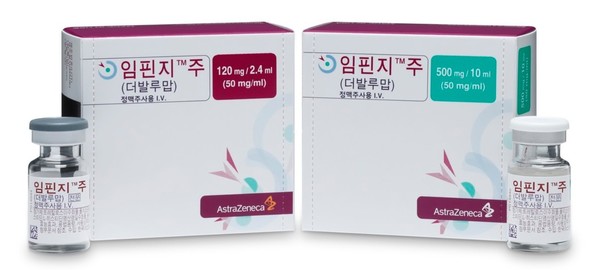A new treatment method developed by domestic researchers and improved overall survival (OS) of progressive biliary tract cancer patients in primary treatment has won approval from the government’s regulator.
On Thursday, the Ministry of Food and Drug Safety approved the combination therapy of Imfinzi (durvalumab) and Gemcitabine/Cisplatin (GemCis) as the primary treatment of adults with locally progressive or metastatic biliary tract cancer.

The Imfinzi + GemCis combo therapy is the first treatment that opened the door for immunotherapy in biliary tract cancer and the only therapy that proved to improve OS compared to GemCis single therapy that has served as the standard therapy over the past dozen years.
It is all the more meaningful that the domestic researchers took the lead in the successful conduct of the TOPAZ-1 study, the global phase 3 clinical trial that served as the basis for approving the Imfinzi + GemCis combination therapy.
Oh Do-youn of the Hemato-oncology Department at Seoul National University Hospital successfully carried out the TOPAZ-1 study based on the positive result of the investigator-led phase 2 clinical trial on Korean patients, rewriting the paradigm of treating progressive biliary tract cancer.
TOPAZ-1 study is a multinational, random, double-blind, placebo-controlled phase 2 study, which combined Imfinzi with the existing standard treatment of GemCis and compared and evaluated it with placebo combination therapy on 685 progressive biliary tract cancer patients.
The registration of patients for this study was made in 17 countries, including the U.S., Europe, and Latin America, and 55 percent of them were made in Asian countries, including Korea, Thailand, Japan, and China.
According to the research data updated in the New England Journal of Medicine (NEJM) Evidence in June, the OS hazard ratio (HR) of the Imfinzi + GemCis group was 0.80 of the GemCis + placebo group, reducing death risk by about 20 percent. The OS in the second year was 24.9 percent for the Imfinzi combination therapy group and 10.4 percent for the placebo combination therapy group.
Profession-free survival (PFS) HR was 0.75, meaning that the Imfinzi combo therapy lowered disease progression and death risk by 25 percent compared to the placebo combo therapy group. In addition, the objective response rate (ORR) of the Imfinzi-combo and placebo combo groups was 26.7 percent vs. 18.7 percent.
On the other hand, the occurrence rates of abnormal reactions with 3-4 grades were similar in both groups -- 75.7 percent vs. 77.8 percent. The most frequently reported side effects were anemia (48.2 percent), neutropenia (31.7 percent), and nausea (40.2 percent), indicating most side effects were caused by chemotherapy.
Based on such study results, the Imfinzi + GemCis combo therapy won approval from the U.S. Food and Drug Administration in early September. It was the first approved primary treatment method for progressive biliary tract cancer in 12 years since GemCis won the FDA nod based on a phase 3 clinical trial of the ABC-02 study in 2010.
Korean government’s approval came two months after the U.S. FDA’s nod, indicating the permission review process went on in the two countries almost simultaneously. For this reason, developers expect the regulator authorities to quickly provide insurance benefits for the Imfinzi + GemCis combination therapy.
As reasons for their optimistic prediction, the developers cited poor treatment records for biliary tract cancer, not many treatment options available in Korea, and robust data on domestic patients based on phase 2 and 3 clinical trials, including OS data, making it easier to conduct the review for reimbursement.
Besides, international academic journals are likely to recognize the Imfinzi + GemCis combination therapy as the new standard therapy as the primary treatment of progressive biliary tract cancer, adding to grounds for reimbursement, industry executives said.

